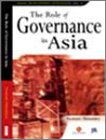Asian Development Experience Vol. 2 : The Role of Governance in Asia / ed. by Yasutani Shimomura.
Material type: TextPublisher: Singapore : ISEAS Publishing, [2004]Copyright date: ©2004Description: 1 online resource (388 p.)Content type:
TextPublisher: Singapore : ISEAS Publishing, [2004]Copyright date: ©2004Description: 1 online resource (388 p.)Content type: - 9789812302007
- 9789812305336
- 304.62095 338.95
- HB887
- online - DeGruyter
| Item type | Current library | Call number | URL | Status | Notes | Barcode | |
|---|---|---|---|---|---|---|---|
 eBook
eBook
|
Biblioteca "Angelicum" Pont. Univ. S.Tommaso d'Aquino Nuvola online | online - DeGruyter (Browse shelf(Opens below)) | Online access | Not for loan (Accesso limitato) | Accesso per gli utenti autorizzati / Access for authorized users | (dgr)9789812305336 |
Frontmatter -- Contents -- List of Tables -- List of Figures -- Contributors -- Acknowledgements -- Introduction -- 1 Regional Governance in Asia: Comparative Analysis of Experiments of Decentralization and Deconcentration in Indonesia, Thailand and Korea -- 2 Governance and Poverty Reduction: Evidence from Newly Decentralized Indonesia -- 3 Local Governance in Indonesia’s Decentralization Era: Prospect and Challenges -- 4 Corporate Governance in Indonesia: A Study on Governance of Business Groups -- 5 Governance Factors in Indonesian Economic Development -- 6 In Search of Endogenous Elements of Good Governance: The Case of the Eastern Seaboard Development Plan in Thailand -- 7 Health Sector Management and Governance in Thailand -- 8 Economic Viability and Local Governance: The Political Economy of Decentralization in the Philippines -- 10 State Bureaucrats, Economic Development, and Governance: The Case of Singapore -- OTHER BOOKS IN THIS SERIES
restricted access online access with authorization star
http://purl.org/coar/access_right/c_16ec
This volume investigates the “missing link”, the complicated realities of the relations between governance and development through case studies of ASEAN countries. Its main objective is to explore a theoretical framework to overcoming the limitations of mainstream approaches by employing case studies on decentralization, crisis management, corporate governance and foreign aid management of both public and private entities. From the beginning of the 1990s onwards, the international aid community has increasingly stressed that “good governance”, together with democracy and protection of basic human rights, is indispensable for sustainable economic development. The terms, however, are complex, broad, and arguable. They largely refer to discipline of government institutions and the capacity of the public secto While a wide variety of empirical studies has been done on the relations between good governance and development, it is still unclear how the differences in governance influence development performance in a real world.
Mode of access: Internet via World Wide Web.
In English.
Description based on online resource; title from PDF title page (publisher's Web site, viewed 01. Dez 2022)


